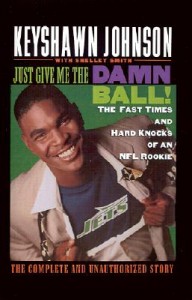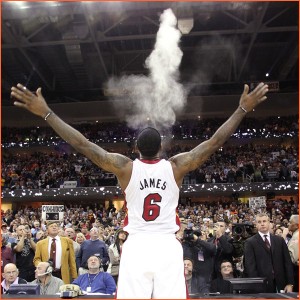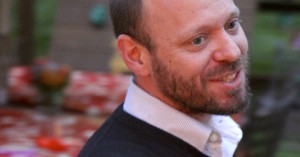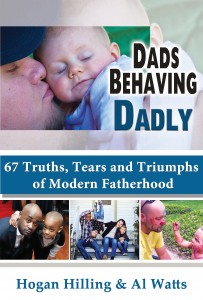You wouldn’t think it to look at them considering their sometimes enormous size (sometimes 7 feet tall and/or 350 pound multimillionaires that exhibit insane coordination and athleticism), but our favorite professional baseball, basketball, football, hockey and soccer players have a ton in common with wee toddlers. How so? Let us count the ways?
1) They all want the damn ball. Almost immediately following his rookie season, former football player, Keyshawn Johnson, stirred quite the controversy when he published an autobiography titled Just Give Me The Damn Ball in which he called one teammate a “mascot” and complained that his then team, the New York Jets, didn’t throw the ball his way enough. Many sportswriters ripped Johnson for having the gall to make such a demand, especially with just one season under his belt, and the controversy lingered long enough for beloved New York Jet Hall of Famer, Joe Namath, to weigh in by saying Johnson was acting “downright ignorant” (Gerald Eskenazi, New York Times, 1997). Johnson is far from the only professional athletes to believe he or she is the difference maker. Plenty of other ballplayers complain about playing time or get accused of hogging the ball (particularly in basketball). Now toddlers aren’t ignorant, but they sure are ball hogs, and should a bunch of them have a ball you can almost guarantee there will be arguments about not sharing as well as tears and wails. At least they’re too young to write books.

2) They break rules they know they’re not supposed to break. Professional athletes break rules all the time, everything from skipping practice to blatantly injuring another player to taking performance enhancing drugs. Former basketball player Allan Iverson had an infamous press conference in which he constantly used the phrase “We’re talking about practice!” when it leaked to the media that he kept missing mandatory Philadelphia 76er practice. Iverson called himself a “franchise player” meaning, in his mind, that he was above it all including the rules. He kept testing his then coach, Hall-of-Famer, Larry Brown, on the subject. He tested the media. He tested the Philadelphia faithful. Toddlers consistently test their boundaries with parents. They know well enough not to climb on bookcases, but they do it anyway…again and again and again. Athletes receive punishments for rule breaking such as suspensions and fines. Toddlers receive time outs or trips to the “penalty box” just like hockey players commit slashing penalties.
3) They refuse to accept blame or admit mistakes. How many times have you seen a football player cause an obvious penalty and then get up and act as if the referee were blind or had it in for him? “Me??” “I didn’t do anything!” How many times have you asked your toddler if they smeared Chapstick all over the television only to hear an unabashed “No!” For years cyclist Lance Armstrong denied using steroids despite piles and piles of evidence against him. He even destroyed people’s lives in order to protect his image. One-time superstar baseball player, Alex Rodriguez, followed the same suit and is now banned from the game for one year. Their refusal to accept blame caused them to become social pariahs despite their eventual weak confessions. Meanwhile toddlers break things; hit, kick or bite other kids; and destroy precious items and blame it on either siblings or imaginary creatures. Both professional athletics and toddlerhood are rife with the blame game and constant “I didn’t do its.” While all we can do is sit back and hope our ballplayer heroes stay clean, it’s our job as parents to teach our toddlers that admitting mistakes is ok and accepting blame is a part of life. Americans greatly appreciate apologies. If only our sports heroes understood that.
4) They have a sense of entitlement. As demonstrated above with Keyshawn Johnson and Allan Iverson, many professional athletes are egocentric and believe the world revolves around them. Not only do they feel they’re above us fans, some often feel they’re better than their teammates. I’m sure it’s a combination of the media and fan attention as well as the millions of dollars showered upon them, but athletes act like they rule the world. They also feel above the law as evidenced by hundreds of professional athletes getting arrested for DUIs or worse. Luckily toddlers aren’t going to commit crimes with the exceptions of occasionally unwittingly shoplifting a candy bar (it’s up to us parents to give it back) or stealing another kid’s property, but they sure are egomaniacal. How dare Mommy or Daddy go to work? How dare we say no to their demands to use a serrated knife by themselves? Unlike athletes who should know better, toddlers are pure id and it’s our job as parents to teach them right from wrong, instruct them on the importance of sharing, and explain why it’s important to keep those candy bars on the rack.
5) They speak of themselves in the 3rd person. Speaking of egocentrism, how often have you heard an athlete say something ridiculous like,”Kobe Bryant needs to figure out what’s best for Kobe Bryant?” It seems like almost every athlete has forgotten “I” and instead goes right for the 3rd person. Toddlers too skip “I” in favor of things like, “Sienna’s toothbrush!” or “Sienna’s hair!” but toddlers can be excused for such self-absorption since we’re repeatedly using our kids’ names in front of them so that they learn who they are and can distinguish themselves from others. Athletes have no such excuse, though you can blame the media which perpetuates this annoyance by asking stupid questions like, “How does Peyton Manning feel about playing for the Denver Broncos?” At least there’s a good reason for toddlers to speak in the 3rd person.
6) Many of them have rituals. Whether it’s Hall-of-Fame baseball player Wade Boggs’ infamous eating of chicken before every game or basketball star, LeBron James’, throwing pre-game chalk-throwing, most athletes attend to some sort of ritual to assure good luck and performance. Baseball infielders go “around the horn” after a strikeout meaning the players toss the ball to each other provided no one’s on base. Basketball players slap each others’ hands after a foul shot. There are so many rituals in sports that it’s impossible to count them all. Some are superstitions. Some are just imbedded in the game’s culture. Toddlers also have rituals, particularly at bedtime. My daughter’s night-night liturgy includes milk; a pink firefly that sprays blue stars across the ceiling; an often unintelligible conversation with a Hedwig puppet (Harry Potter’s owl); Daddy and daughter singing “Rainbow Connection”; Kermit the Frog wishing her goodnight, telling her all her stuffed animal friends will watch over her during the night, and asking for a kiss and a hug; and finally a kiss goodnight and reinforcement of love from Mommy, Daddy or both. The night-night ceremony helps our daughter feel safe. Rituals help athletes feel focused. So long as something crazy like human sacrifice isn’t involved, it’s all good.

7. They like to make up funny dances. I still need to capture some of the hilarious moves my daughter makes to things like “Billie Jean” and the Alf theme music, but football players are known for wonky post-touchdown dances and thankfully you can find Jimmy Fallon’s “Evolution of End Zone Dances” on YouTube. Enjoy!
I’m sure I’m just at the tip of the iceberg. What other ways are professional athletes like toddlers?




